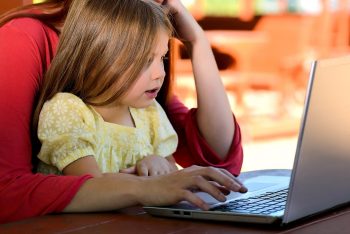Home / Health & Wellness Articles / Tips and Life Hacks /
7 Tips for Parents to Support their Children’s Mental Health

The coronavirus pandemic has many of us fearful for what’s to come next. The unknowns of the disease and the course it will take is causing a great deal of stress and anxiety. Many adults can recognize these feelings, but children don’t necessarily know how to process them or how to cope.
“Children are likely to be worried, anxious and afraid, just like many adults,” says Niki Grajewski, Centerstone clinical manager. “But there are simple strategies that can address this, including giving children the love and attention they need to resolve their fears and being honest with them, explaining what is happening in a way that they can understand no matter their age.”
Check out these tips that parents can use to help support their children’s mental health during this crisis:
- Talk to them about the crisis: Knowledge is power and explaining the crisis in a way that makes sense to your children is very important. Be sure to talk about all of the people working hard to keep them safe and ways they can help keep themselves safe – like staying away from large groups and washing their hands. Be sure to also explain this pandemic is temporary and things will improve in the future.
- Establish structure and routine: Most people enjoy keeping to a regular schedule, and children are no exception. Try to limit surprises by scheduling the entire day, including school time, family time, breaks, meals and play time. This can help children adapt to their new normal. HOWEVER, it’s also important to stay flexible during this time. For parents who are trying to work from home while also taking care of their children, this can be rather daunting. “Finding structure that works for you and your family is what is important, not following a preset structure that someone else established,” says Grajewski.
- Stay active: Physical activity is incredibly important for the mental health of children and adults alike. So make time each day to move around outside and get some fresh air and Vitamin D.
- Limit screen time: With many educational institutions being temporarily closed, it may be impossible for your child to go a day without screens, but limited screen time outside of education can free up more time in the day for being with family, playing outside or reading a book. Limiting screen time can also reduce the amount of time they’re looking at the news, which can unknowingly be causing stress and anxiety.
- Encourage socialization: Social distancing doesn’t mean social isolation! It is very important for children to be able to continue talking to their friends, neighbors and loved ones – even if it has to occur via phone, text or email.
- Foster open communication: It is important for children to feel safe coming to you with their fears, concerns, and problems. Keep an open mind and be a good listener for your children – they’ll really appreciate it.
- Share some coping mechanisms: Change is hard, especially for children. Talk with them about how you cope with fear, stress or anxiety. Taking deep breaths, exercising, thinking positive thoughts, playing with pets and journaling are all good ways children can cope with the crisis. Whatever works for you might work for them!
Through this crisis, Centerstone remains fully operational and continuing to serve our clients and communities. As always, the health and well-being of our clients, staff and community stakeholders is our main priority. We have implemented system-wide strategies that reduce the risk of exposure while preparing us to respond effectively in the event the current threat level escalates. To reduce the risk of COVID-19 exposure at this time, almost all appointments are being conducted via telephone or telehealth (video). For more information, please click here.


